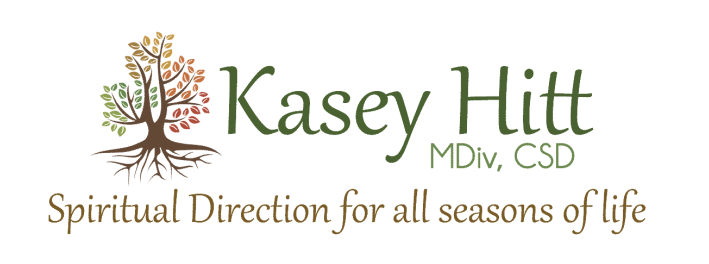|
Advent is a time of gestation. Much like the discomfort and anticipation of pregnancy, we wait on the arrival of what is deeply hoped for and anticipated.
A few weeks ago I was in a sensory-deprivation tank floating on 1500 pounds of salt. It's supposed to be (and usually is) relaxing but that day I kept squirming around...like a baby in the womb. Last year I went to a Benedictine Sister for both Spiritual Direction and healing touch at a monastery where I would be facilitating a retreat the following day. During the time of laying on of hands, when she got to my abdomen she said, "We are in the womb of God who is birthing us. Birth pains are difficult, but we WILL be born." I teared up as I heard these words of deep hope, because I had been restless then, too. In liminal space, I felt the strain of being "betwixt and between," especially in relationship with my own religious institution where the leadership continued pulling back from engaging contemplative practice with each passing year. Knowing the transformative power and wholeness found in contemplation and action, I continued to hope. What this hope looked like in regard to my faith community, I found myself full of questions with no easy or sure answers. Her words of hope spoke to my soul but did not take away the struggle. Contrary to idealistic views of hope, theologian Jurgen Moltmann (known as the theologian of hope), writes in Experiences of God, "...whenever faith develops into hope it does not make people serene and placid; it makes them restless. It does not make them patient; it makes them impatient. Instead of being reconciled to existing reality they begin to suffer from it and to resist it." The Sister's words of hope gave me deep permission to accept the struggle and discomfort as part of the process of rebirth. When I realized that it was not wrong, but natural, to be squirming in the float tank, I found myself smiling with a newfound acceptance. Instead of trying to be still, I playfully allowed my arms and legs to stretch and move however they wanted. It felt freeing. If I could allow this restlessness in the float tank, how about other in places of my life? After all, Saint Paul reminded the people in Athens of the perennial truth of their own Greek poets when he quoted, "For in him we live and move and have our being." Sometimes we rest, sometimes we walk, sometimes we wriggle in the womb of God. _____________________
 Or the imagination? How about touch? Or silence? Well the obvious answer is no one. But many Christians act as though they are forbidden territory. If it's anything other than the Bible and words (and even those are under regulation) it's to be feared. When I mention Centering Prayer or Reiki there are those who say "Oh isn't that New Age or Eastern? I can't do that, it's dangerous, I could be opening myself up to the Devil." I once heard a well-meaning pastor urge his congregation to trust God rather than the imagination thus setting the imagination in opposition to its Creator. It's not the imagination itself that is the problem, it's where we let it go. Saint Ignatius was transformed by God through his imagination in the 14th century and so developed spiritual practices to engage Scripture and prayer in this way. Elijah did not hear the voice of God in the earthquake, wind or fire but in the sound of sheer silence. Jesus made seeking out a quiet place (to listen to the Father who spoke within him) a regular spiritual practice. Jesus also touched people and they were healed (and the way he went about healing was different depending on the situation and person). He breathed on his disciples before telling them to receive the Holy Spirit (the name for Spirit in both the Hebrew and Greek can also mean "breath"). Much of his ministry looked more "Eastern" than "Western." There are some religions and traditions that have done a better job incorporating things like silence and the body into their spiritual practices. Rather than allowing fear from keeping us from receiving a gift, we can learn from them. With discernment (sifting wheat from chaff), we can integrate, or more likely recapture, what's been missing in our own tradition. Questions arising from the Biblical narrative can help us with the sifting. If we're to love God with all of our heart, mind, soul and strength, I think we need to humbly leave space for "holy envy." Theologian and scholar, Krister Stendahl coined this phrase, referring to the practice of recognizing and admiring elements in another religious tradition, even allowing those elements to enrich one's own faith tradition (or wishing it could). As a United Methodist, I've experienced holy envy in denominations like Episcopalian, Lutheran, Presbyterian, Southern Baptist, and others. As a Protestant, I've experienced holy envy with Catholic, Orthodox, Celtic Christian and Saint Thomas Christian practices and beliefs. As a Christian, I've experienced holy envy in Judaism, Buddhism, Hinduism, Sufism (mystical Islam) and others. And without exception, the places of holy envy have invited me to a deeper awareness and experience of the love of God, neighbor and self. No one owns breathing, imagination, silence, the body, or even truth (this is not to say that all religious truth claims are equal, but that truths are found in all religions). Rabbi Rami Shapiro closes his emails with "Alles iz Gott." He wants to remind me or whoever else emails him looking for wisdom that, "All is God" because God embraces, transcends and is the source of everything! And our Creator is amazingly generous (as Matthew 5:45 reminds us that the rain falls and sun shines on everyone). So with your heart, mind, soul and strength listen and learn. Allow yourself to remain open to holy envy. Discern. Let go, discover anew, or integrate. And find yourself further on the path of Shalom, this already-not yet living into the Kingdom of God where individuals, communities and all of creation experience wholeness, peace and completeness...and a holy sigh of relief! |
AuthorKasey is a scarf, ball and club juggling spiritual director just outside of Nashville, TN. Play helps her Type-A, Enneagram 1 personality relax, creating space for poetry and other words to emerge. She also likes playing with theological ideas like perichoresis, and all the ways we're invited into this Triune dance. Archives
January 2024
Categories
All
|
By clicking “Sign up for E-News” I consent to the collection and secure storage of this data as described in the Privacy Policy. The information provided on this form will be used to provide me with updates and marketing. I understand that I may modify or delete my data at any time.

 RSS Feed
RSS Feed

